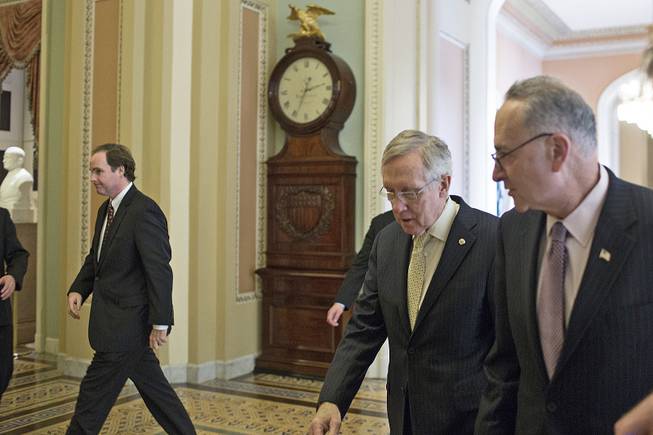
The New York Times
Sen. Charles Schumer, D-N.Y., right, and Senate Majority Leader Harry Reid, D-Nev., center, on Capitol Hill in Washington, Jan. 24, 2013. Senate Democratic and Republican leaders agreed to new limits on the filibuster on Thursday, an effort to speed action in the often-clogged chamber by reducing how often senators could use a common tactic to slow the legislative process.
Thursday, Jan. 24, 2013 | 8 p.m.
After many weeks of saber-rattling, Senate Majority Leader Harry Reid decided to take the conciliatory route around filibuster reform, striking a deal with Minority Leader Mitch McConnell to make modest changes to the Senate’s signature procedural snafu that lawmakers eased through Thursday night.
The Senate voted to approve temporary and permanent changes to the filibuster rule — but neither group went so far as to eliminate the filibuster altogether, or replace the procedural challenge with a requirement that senators who wish to filibuster must physically hold court on the floor.
As such, the result fell far short of what many liberal senators had hoped to accomplish through reform.
Sens. Jeff Merkley of Oregon, Tom Udall of New Mexico, and Tom Harkin of Iowa had been urging Reid to push a much more sweeping set of filibuster reforms through the Senate, angling for the majority leader to exploit the “nuclear option” to get them through.
The “nuclear option” is a move whereby Reid would have passed the bill eviscerating the procedural filibuster — the threat to block a bill that can only be circumvented by a 60-vote majority — by essentially ignoring its existence. The rationale for that approach is that because filibuster does not appear in the Constitution, it cannot bind any new Senate adopting its rules.
Merkley, Udall and Harkin believed Reid had the 51 votes for the nuclear option — and this week, even Reid himself acknowledged that there were enough Democrats ready to vote in favor of the “nuclear option” to get it through.
But in the end, Reid eschewed sweeping changes in favor of making a deal that the bulk of the Senate could swallow.
Though the changes do little to change the political climate surrounding procedural filibusters, they will likely help expedite the pace of Senate business — even the Senate business of filibustering.
The Senate voted 78 to 16 for a set of changes to the Senate’s “standing orders,” which will apply only to the 2013-14 Congress. These would eliminate the minority’s right to filibuster a bill if Reid allows at least four amendments — two from Republicans and two from Democrats — to be presented to it. The rule changes also ensure that if Reid follows that procedure, he can shorten the requisite waiting period to bring up a bill from 30 hours to four. Nominations that clear a filibuster on a motion to proceed would also face a shorter debate period (eight hours instead of 30 hours, except for on judges and Cabinet nominees).
Among the Nevada delegation, Reid voted for those changes, while Sen. Dean Heller of Nevada voted against them.
The Senate also voted to approve permanent changes to the Senate’s filibuster rules.
Lawmakers voted 86 to 9 to create a “bipartisan” means of expediting the debate process: If the majority and minority leaders, seven Republicans and seven Democrats sign a motion to bring a debate to a close, they can, whether the official debate clock has run out or not. That should save days, as every time a controversial issue is filibustered, senators have to “burn” 30 hours between procedural steps, creating waiting days where effectively nothing gets done.
The permanent changes also will, lawmakers hope, revive the conference committee process by which similar House and Senate bills are brought into alignment. The rule change will reduce the number of filibuster-able votes it takes to appoint and assign a conference committee from three to one.
Heller and Reid both voted in favor of the second set of changes.
Reid acknowledged that the changes do “not go as far” as some were hoping for.
“But it is a step forward,” Reid said. “It is my hope that these reforms will help restore a spirit of comity and bipartisan cooperation. If these reforms do not do enough to end the gridlock here in Washington, we will consider doing more in the future.”

Join the Discussion:
Check this out for a full explanation of our conversion to the LiveFyre commenting system and instructions on how to sign up for an account.
Full comments policy